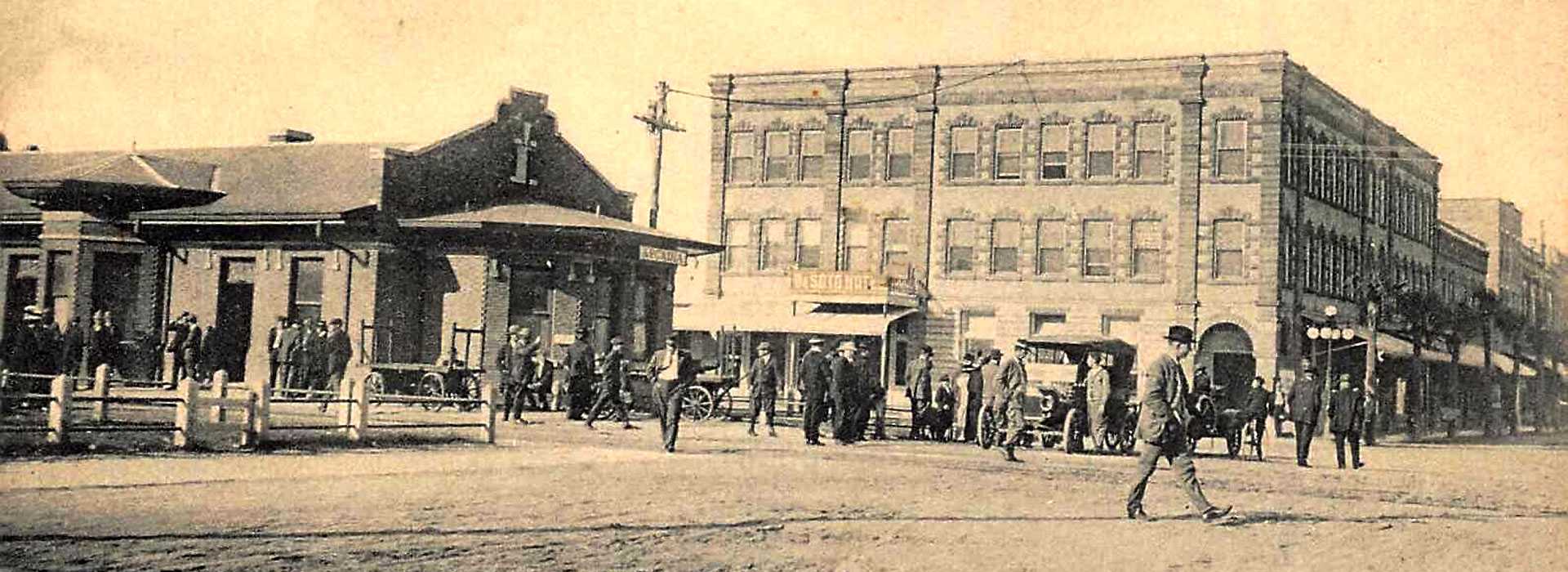The Founding of Arcadia, Florida
by Carol Mahler
The Waldron and Williams families settled on the east bank of Peace River starting in 1856, and 25 years later, they were still the only residents of the area that became the City of Arcadia, according to Thomas J. Herndon. Others joined them, and by 1883, they had enough population to apply for a post office.
The settlement was known by various names. The area was known as Waldron’s Landing because James Waldron’s cabin was near Peace River, the main means of transportation. Some called it Raulerson’s Landing, namesake of Harris Raulerson who transported produce from upriver farmers to Charlotte Harbor and brought them supplies such as coffee, tobacco, and flour. The area was also called Tater Hill Bluff, because most of the produce was potatoes or “taters” for short.
The Rev. James Madison Hendry had recently moved his sawmill to the east shore of Peace River to exploit the long-leaf pines that grew thickly in the area. On his way, he stayed overnight with the Thomas H. Albritton (1818-1907) and Frances Albritton (1821-1879) family and announced that the next day was his birthday. The Albritton’s 22-year-old daughter, Arcadia Matilda Albritton (1861-1932), who was married to William Wesley Coker (1859-1904), baked a birthday cake for Hendry.
As if to repay her kindness, he suggested the name “Arcadia” when the settlers gathered to decide on a name for their post office. David S. Williams concurred, despite the suggestion of “Acadia” by Col. D. C. Douglass, a Civil War veteran and well-read man, who quoted Longfellow’s poem “Evangeline,” as noted in Footprints and Landmarks: Arcadia and DeSoto County, Florida, by Howard Melton.
The Arcadia post office was established on Nov. 19, 1883, and Williams was appointed as the first postmaster, followed by Herndon not quite a year later on Oct. 24, 1884.
In July 1885, the Florida Southern Railway started construction of tracks south of Bartow. The line was about a mile east from the village, and the new depot was called Arcadia. Only 16 families lived within a mile, but that soon changed. Businesses were relocated near the tracks, and population increased as settlers rode the train to the “end-of-the-line” in Arcadia between March and June.
According to the October 23, 1886, Fort Myers Weekly Press, the new settlement had “about 40 dwelling houses, mostly two-stories, and about ten more being erected . . . four stores, general merchandise, all doing a rushing business; three boarding houses, all doing a good business, and still many a campfire can be seen in town,” as quoted in “Florida’s Peace River Frontier” by Canter Brown, Jr. “There are two saw mills and one planing machine, all kept busy until ten o’clock at night and still can’t supply the demand for lumber; two drug stores with a good supply of drugs, medicines, &c . . [and a] hotel, two-stories high.”
By the year’s end, the settlement had enough population to incorporate as a town, and Ruby Whidden copied the following from the file in the Clerk of Courts office. “The registered voters of Arcadia in compliance with the following notice published in the ‘Peninsula Gazette’ of Fort Ogden, Manatee County, State of Florida: ‘To all persons concerned: know all ye that we the undersigned registered voters of Manatee County, Florida, residing within the following limits: commencing at the NW corner of Section 25, Township 37 S of Range 24 E and running south to the SW of Section 36, thence east to the SE corner of Section 31, Township 37 S of Range 25 E. Thence north to the north corner of Section 30, thence west to the point of beginning, desiring to incorporate the town of Arcadia, Manatee County, State of Florida, is hereby given notice as required by law to the registered voters who reside within the limits above set forth to assemble at the Store House of J.W. Bailey in the Village of Arcadia on Monday, December 6, 1886, the same being the first Monday in December in said year and selected officers and organize municipal.’
“In pursuance to the above notice, the qualified voters to the number of 31 being present chose Capt. J. W. Whidden, J. D. Haygood, and T. J. Herndon as the managers of the election. The ballot being taken, the following officers were elected: Mayor B. F. Baldwin; Clerk and Treasurer, George H. Altree; Marshall and Collector, C. H. Bonard; Aldermen: J. W. Bailey, F. M. Waldron, W. E. Daniels, E. E. Waldron, W. H. Hollingsworth, and C. C. Johnson.” A version of this article was published in the Arcadia Community Local on Dec. 2, 2021.

